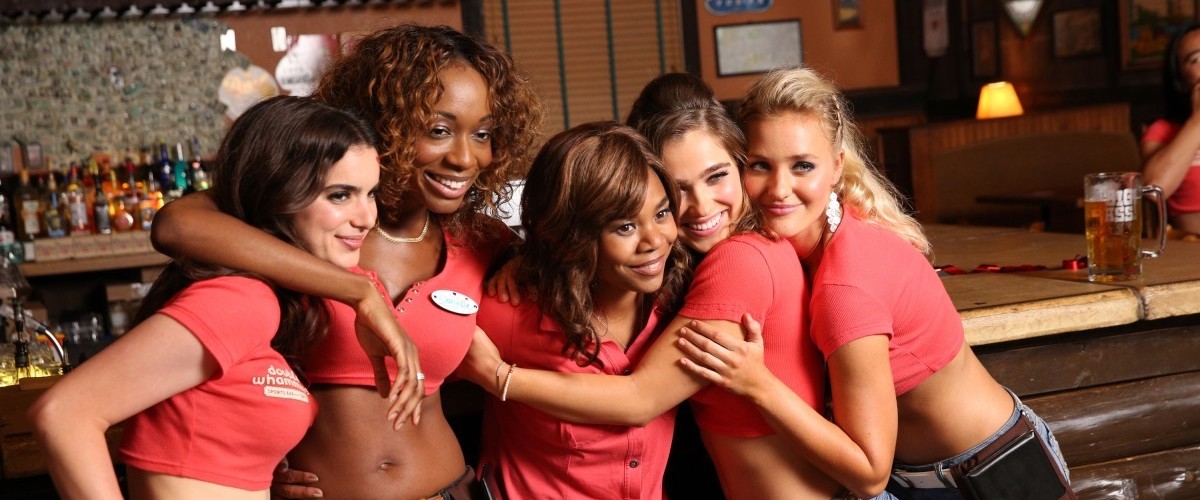Finding empathy in yourself requires thinking about the lives of those around you—why they made certain choices, the cost of those choices, the weight or lightness of them and what’s likely to come next. To experience empathy is to understand and share the feelings of another person; to act with empathy demands more. It demands calm. It demands compassion. It demands foresight and patience. It is not often dramatic, but it is the core of “Support the Girls,” and in Andrew Bujalski and Regina Hall’s extremely capable hands, empathy becomes as active and compelling as any car chase, sword fight, or knock-down, drag-out fight. A simple thing, yes, but one well worth a valiant battle.
In writer/director Bujalski’s engaging, deeply-felt comedy, that’s the battle Lisa (Hall) wages over the course of a day and change—and one she seems to have been waging for years. As the manager of Double Whammies, a “family” restaurant specializing in “boobs, brews, and big screens,” she makes respect a priority. To be clear, that’s respect for her servers. Demanding respect for herself isn’t high on her to-do list, though most of the time, there’s no need. These women—particularly Maci (Haley Lu Richardson, excellent) and Danyelle (Shayna McHayle, also very good)—make plain their affection and loyalty with increasing regularity as Lisa’s bad day gets worse, but it’s there even as the day begins. “You like working here? You can be honest, think about it,” Lisa says to Danyelle, who responds instantly: “I like working with you.”
Anyone would. “Support the Girls” excels in a lot of ways—should any awards show decide to begin handing out trophies for Best Performance by a Confetti Cannon, this film will have the category locked up tight—but it works best as a character study, and with Lisa, it’s damn near impossible not to wind up immediately in her corner. Lisa begins her day by crying in her car, but her first act is to ask how a bemused Maci is doing (“How am I?”); she looks at her own bad news as good news for one of her girls, and lets an employee who committed a fireable and prosecutable offense know that he’ll need to quit at the end of the day, rather than involving the police. Hall gives a career-best performance, imbuing this woman with incredible patience that’s showing signs, however faint at first, of wearing thin. Her laughter always walks close to tears, and her irritation is always laced through with amusement. An employee shows up with an unusual tattoo on her rib-cage—a non-starter in the mandatory crop-top “entertainment industry”—and as Lisa navigates these particular waters, Hall’s face displays a heady mix of what were you thinking? and how, how, how is this real life?
Hall is magnificent, and given plenty of room to be so by Bujalski, who approaches Lisa with a level of empathy equal to that which Lisa shows to her employees. In the aforementioned crying-in-car scene, he doesn’t actually focus on the tears. There’s no head on the steering wheel, no stifled sob. Instead, we see Lisa carefully blotting the tears from her face, tending to her eyes, collecting herself, and pasting on a smile which, though obviously summoned into existence, nevertheless comes with genuine warmth. While the camera’s gaze is intimate, sharing Lisa’s occasional private moments of release, it often remains at a bit of a distance, a choice that brings with it two advantages. First, it gives the audience a chance to see Lisa’s tells—tension in the shoulders we’d miss in close-up, a simmering anger in the voice we’d never catch if the lens were directed at her, not at the “Whammie Girls Golden Rules.” (Rule 1: NO DRAMA!)
Still, empathy for his protagonist may not be the only reason for Bujalski’s respectful distance. Double Whammies is a place designed to treat women as objects, and replaceable ones at that. To the customers, they’re targets, or decor, or vendors of attention—something which Maci responds to by treating herself that way, albeit with an upbeat attitude and healthy sense of bemusement. How to avoid a pawing customer and how to laugh with your mouth open are skills of equal worth. The film never diminishes these women, though the “industry” and its patrons do, at nearly every turn; the sole exception is Bobo (Lea DeLaria), one of Whammies’ most frequent customers—and, the film suggests, its only female regular. She’s there for the boobs, beers, and big screens, but these women are people to her, and she becomes the only outside source of support.
Rereading this review, it strikes me that none of this probably sounds all that funny. And it’s not. But the vibrant blend of Hall’s grounded, emotionally rich, and restrained performance and the absurdity of the world in which her character lives is one from which humor emerges naturally. It breathes comedy, rather than striving for it. Danyelle tells Lisa that after tears comes laughter, and after laughter, screaming; yet right up until the screaming happens—a cathartic, visceral scene that’s easily among of the year’s best—the laughter keeps coming, too. Weeping, giggling, and bellowing are all expressions of feeling, after all. They all come from someplace primal. And after a day spent tending to the feelings of others, it’s perhaps understandable that Lisa might want to do one, then maybe another, and then maybe all three at once.




















